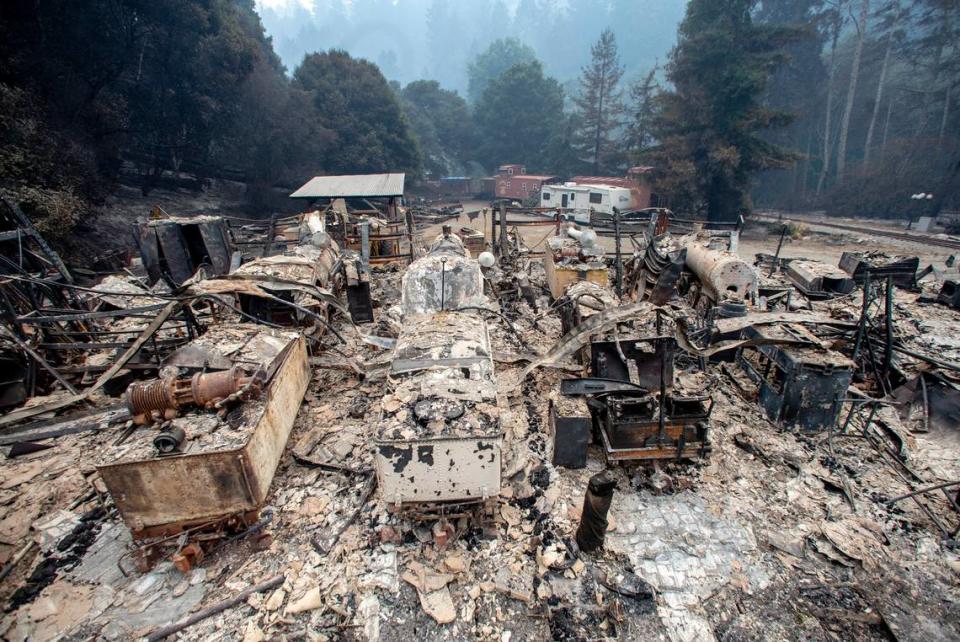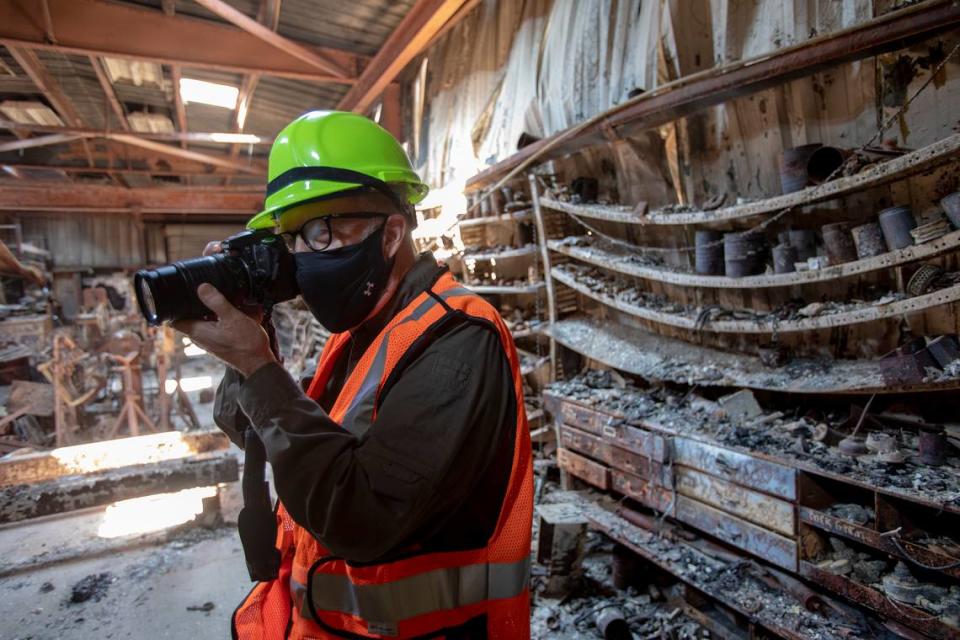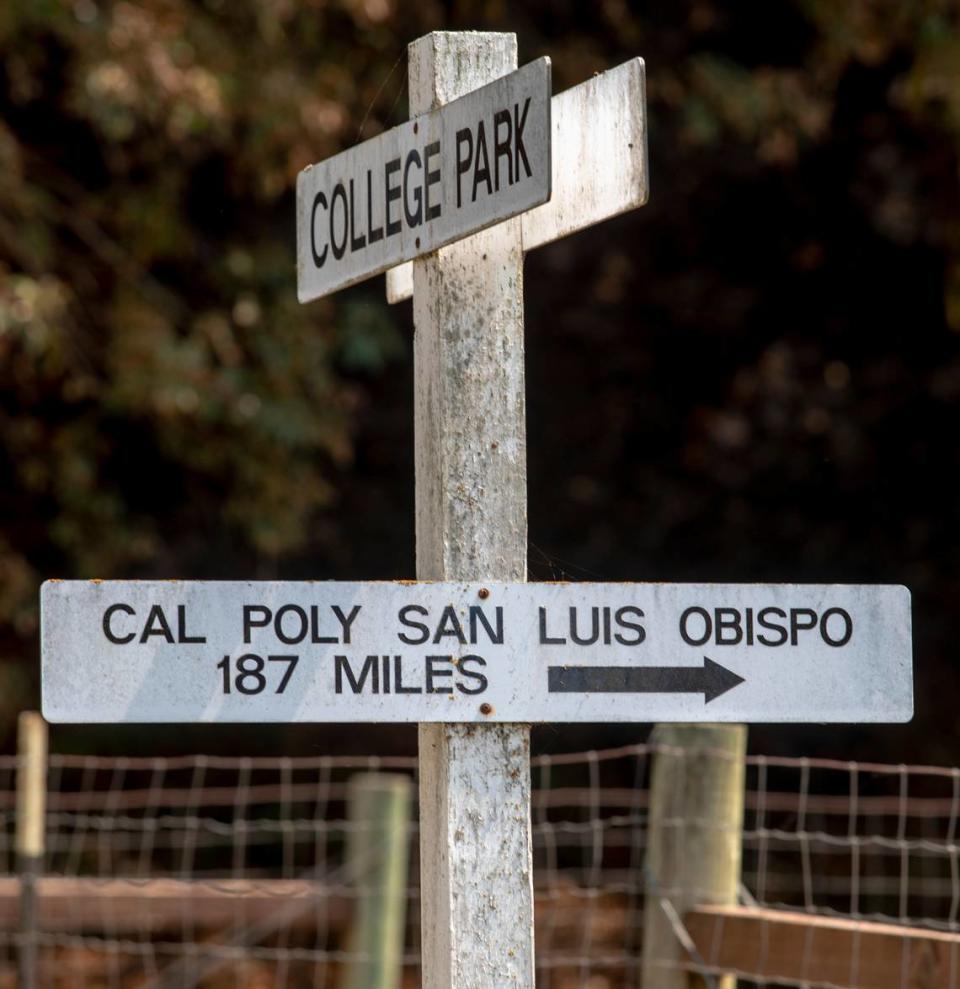Cal Poly’s Swanton Pacific Ranch looks to rebuild after fire ravages historic property
As the CZU Lightning Complex Fire tore through northern Santa Cruz County, the caretakers of the coastal Swanton Pacific Ranch were stunned.
The 3,200-acre preserve off Highway 1 north of Davenport — run by Cal Poly San Luis Obispo since 1993 as an unmatched bio-diverse lab for forest management and sustainability research — had seen threatening fires before, notably the Lockheed Fire in 2009. But nothing had damaged its vital infrastructure or the frozen-in-time homes that served as local historical touchstones.
The span of good fortune ended Aug. 18, however, when ranch director and Cal Poly professor Brian Dietterick and his staff found themselves scrambling to evacuate the area as flames descended toward the ranch — a late-in-life gift to the university from Cal Poly alum Al Smith, the San Jose native who as president of Orchard Supply Hardware built the one-time farmer’s co-op into a West Coast home-and-garden powerhouse.
“Even when (the fire) was on top of Last Chance Road, it would still take a while to get across Swanton Road,” Dietterick recalled thinking. “Then it jumped. When it got closer and closer, we realized the facilities on the north end were in jeopardy.”
The ranch residents who lived and worked on the property got themselves and all the large animals on the grounds to safety. They watered the perimeter of an enclosure that housed 100 chickens they were forced to leave behind.
Over the next few days, with the hills above still smoldering, Dietterick and his staff surveyed the damage to the ranch. In one night, so much of this largely untouched repository of Santa Cruz history — and the broader history of the California coast dating back to the turn of the 20th century — was gone.

That included Smith’s house, which he retired to after Orchard Supply Hardware was sold in the late 1970s. Ancestral houses belonging to the homesteading and pioneering families who settled and established the area, such as the Staub and Archibald homes, were also destroyed.
The railyard for the Swanton Pacific Railroad, the miniature passenger train system Smith required to be maintained and operated when he donated the land, was heavily damaged, along with adjacent buildings that had been housing the university’s ranch staff. At least two 1/3-scale steam locomotives — built by Oakland inventor Louis M. MacDermot for the 1915 Panama-Pacific International Exposition in San Francisco — burned as well.
Also lost in the fast-moving fire was the single-building Seaside School, a local cultural hub that was operational until the early-1960s, attended by children of families who are household names in the region, including the Gianone, McCrary, Pini, West and Wilson families.
“I wish it hadn’t happened. That way things would still be the same,” said 97-year-old Marie Stoner, née Pini, who graduated eighth grade at the school in 1936. “I grew up there.”
Her son, notable surf historian Kim Stoner, echoed that properties in and around the ranch truly had stayed the same over the past century. In the past decade, he turned over an array of family archival photos and documents to help preserve the area’s history, some of which landed in the master’s thesis of Jeanine Scaramozzino, who is now a chief librarian at the university.

“That area if you were to drive up there, over a period of 100 years, you didn’t see much change up there. It was like a journey back in time,” Kim Stoner said. “I’m hoping everything will be brought back to what it was, but it will take some time.”
The ranch property, whose namesake Fred Swanton is credited with bringing hydroelectric power to Santa Cruz and spearheading what would become the world-renowned Santa Cruz Beach Boardwalk, was accumulated gradually by Smith over the latter half of the 20th century.
Prior to his death in 1993, Smith — who earned bachelor’s and master’s degrees from Cal Poly San Luis Obispo — had been leasing the Swanton Pacific Ranch to the university for $100 a year to keep it undeveloped and as a working farm for students studying agricultural sciences. He willed it to the school on the agreement that it remain in that capacity in perpetuity.
Chandler Reller, 25, a Cal Poly alum who went to work at the ranch in 2018 after graduating, spent part of Monday sifting through the rubble of the building where he lived on the railyard property, recalling that he had just enough time to grab his cat and head out when the evacuation order came down. Among his primary tasks was to maintain the water and other systems that make the ranch self-sustainable.
“Every day it was something different,” Reller said. “Until this, it was the gig of the century.”
Dietterick, who lost his home when the schoolhouse burned, is understandably reeling from the destruction, having watched first-hand as the ranch became a highly sought-after research site for agricultural students from across the state. The fire came as Cal Poly was launching a significant revitalization of the property to improve its sustainability — with livestock, crops and timber harvesting – and expand its signature “Learn by Doing” offerings in forestry and crop sciences.

“No place offers as diverse an educational opportunity in true crop and forest stewardship,” Dietterick said.
As he spoke at the ranch Monday, Dietterick pointed to some buildings and other areas that survived the CZU Lightning Complex Fire, like the apple orchard across from the schoolhouse and the back half of the train depot, where the picnic tables that would host alumni and community events, such as Al Smith Day, were untouched. The IT system is gone — a big loss considering that it provided high-speed internet in an area with no cell signal, as well as direct phone access to the Cal Poly campus about 180 miles south — but the water system appeared to have survived.
Those 100 chickens also survived the fire; though in keeping with the purpose of the livestock program, they were processed a few days later.
“We’re not starting at square zero,” Dietterick said. “I know this community well. It’s one of the most cohesive groups I’ve ever been around, and will be coming up with a plan of action, especially when the chips are down.”
Andrew Thulin, dean of the College of Agriculture, Food, and Environmental Sciences, said the next weeks and months will be about assessing what can be salvaged. He, like Dietterick, is also pondering what new research opportunities might come from the fire and its impact on the land.
“We’ve got a lot to think about,” he said. “But we will rebuild the ranch. I can tell you that.”

